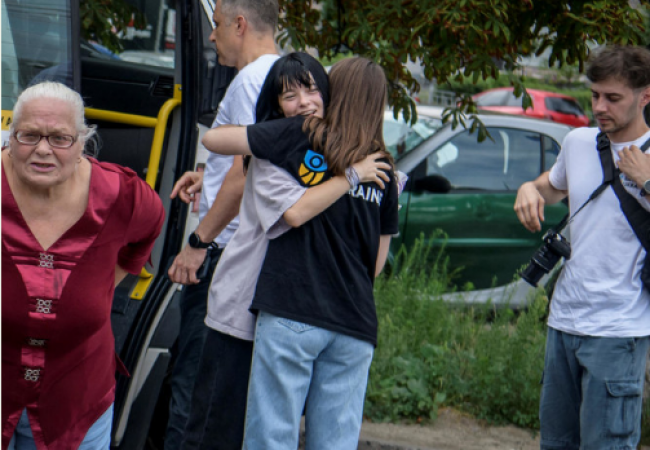
kyiv: On a terrace behind a cafe in Kyiv, there it was. a table for ping pong.
Ilona Pavliuk, 16, could hardly believe it was acceptable to stop and play after spending nearly a year and a half locked away in hiding under Russian occupation, followed by a daring escape last month.
"People here are so kind; even if you're not good at something, they'll teach you. Even together, they can play with you, she said. In occupation, there was no ping pong, and kids didn't even play football in the stadiums. In Nova Kakhovka, there is a stadium where no games are played any longer.
Since the Russians arrived in their village, Pishchane, on the south bank of the Dnipro River, at the beginning of their invasion last year, her ailing father had kept Ilona and her brother Maksym, 15, hidden in the home.
Also Read: US SEC to end up the Investigation and result Better.com into huge financial suffering
I was unable to leave because my father was concerned. He claimed that I might be raped by Russians. Or kill me—there have been instances like this. Even though the park is only 100 metres from our house, he wouldn't let me go there. So I didn't go out, I stayed at home," Ilona said in a Kyiv hostel while twirling Valera, her plush penguin.
I wasn't studying, and I still haven't graduated. I have no documentation. I suppose that makes me a dunce. Their mother passed away from AIDS ten years ago, and their father finally succumbed to the disease last month, leaving the children orphans.
They were going to take me to Russia, give me a Russian passport, and put me in an orphanage, so I knew I had to get out, Ilona said. "They visited my house a day or two after I left, but I wasn't home. Could I have stayed?
Parts of Ukraine under Russian occupation, according to President Vladimir Putin, have been annexed. Thousands of orphans and vulnerable kids, according to Moscow, have been brought to Russia for their safety.
Also Read: US Tourist Fatally Injured in Boat Crash off Amalfi Coast
A generation of children's Ukrainian identity is being erased through forced deportation, according to Ukraine, and this is a crime against humanity for which Putin has already been indicted by the International Criminal Court in The Hague.
Save Ukraine, a non-profit organisation that operates an underground network inside the Russian and Ukrainian territories under occupation and aids children in fleeing, helped Ilona and Maksym escape. It claims to have saved 200 kids so far.
According to Mykola Kuleba, the founder of Save Ukraine, children whose parents pass away are the most urgent cases because the Russian-installed occupation authorities will quickly impose legal guardianship.
All abandoned children are relocated by the Russians across their territory, he claimed. "They designate a guardian or adopt a family for the child. After that, no agreements can be reached and getting a child back is very difficult. Because of this, it's essential to return a child as soon as possible, before this guardian shows up.
Also Read: Thaksin Shinawatra Delays Return: Anticipation Grows as Trip to Thailand is Postponed
To help Maksym and Ilona, Save Ukraine moved quickly. Days after their father passed away, volunteers in Russian-controlled territory assisted the kids in escaping, first to Russia, then to Belarus, then across the border, and finally back home to Ukraine. To safeguard activists along the way, the route's specifics are kept a secret.
Ilona and Maksym are currently residing in the group's hostel in Kiev. When their passports from Ukraine are ready, they will go stay with their late father's ex-wife, who is currently a refugee in Slovakia. Ilona only realised she was finally safe when she saw the border agent who had allowed her to cross into Ukraine from Belarus. She remembers crying when she first arrived and lets a new tear fall. "I broke down in tears as soon as I saw the first Ukrainian soldier. I answered, "Because I'm in Ukraine!" when he asked me "Why are you crying?"